They Came From Outer Space
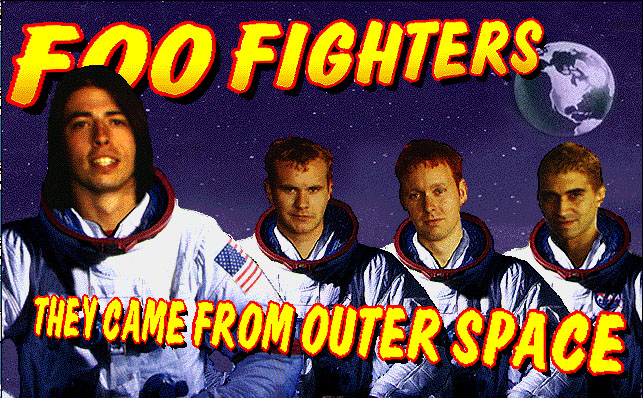
Blender 1995
Dave Grohl slides his lanky frame into his new 'Vette
and fires it up. He allows himself a huge grin as the engine
lets out a fat belch and settles into a steady growl. The vehicle
is a cream-white 1968 Coupe, to be precise, with a T-roof and
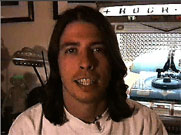 |
| Dave introduces the band |
retractable headlamps and a black leather interior, and you don't
have to tease him about it because he's already taken plenty
of shit since he bought the "pimp-mobile a few weeks ago.
"Everybody says its either a penis extension or a sign
of midlife crisis," he says, "and I'm too young for
a midlife crisis..." He's 26 years old, but
given the sort of life he's been leading lately -
as drummer for the monstrously successful
Nirvana and now as singer/guitarist with
his new band, the Foo Fighters-it's almost
surprising he hasn't hit critical mass. But
while Grohl is ambivalent about his own
considerable star power and uncomfortable with the trappings of celebrity, it doesn't seem to have stopped him from helping create some of the most exuberantly
catchy punk anthems of the decade.
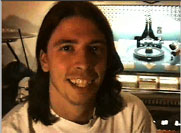 |
| Expectations & baggage |
Despite overheated expectations surrounding
the Foo Fighters-which include guitarist
Pat Smear (former Germ, and Nirvana
sideman), bassist Nate Mendel and drummer
William Goldsmith (both of the now-defunct
Sunny Day Real Estate>-Grohl is determined
to steer wide of the media spotlight, imposing
a near-total press blackout. It's a decision based
largely on his experience as part of the most
hyped and scrutinized rock outfit in recent
memory. "The whole thing just kind of freaks
me out;' he acknowledges, "Iím sure a lot of
the reason most people are going to want to
do interviews with us is to kind of get inside
a member of The Band That Self-Destructed,
and find some explanation," Still, the Foo
Fighters' decision to strong-arm the media
doesn't seem to have dampened
the presses breathless myth-making -
sample headline from the Toronto Star;
"Foo Fighters Prove There Is Life After Death."
 |
| Pat talks cigarettes |
Without benefit of prerelease promotion or advertising, the Foo Fighters' debut
album became the subject of considerable anticipation last spring, fed in part by
bootlegs circulating throughout the tight-knit Seattle music community.
"I'd give tapes to everybody,Ē Grohl admits, "Kids would come up and say
[forlornly], 'Nirvana was my favorite band; and I'd say, 'Well...here, have this.'"
Nearly two months before the album's official release date, radio stations in Los
Angeles and Seattle began airing unfinished tracks. Capitol Records promptly
issued a cease-and-desist order, but not before the phone lines lit up in a frenzy
of requests. Ultimately, Grohl is forced to concede, "There's really not much you
can do. If you don't want anyone to come to your shows then don't make a
record, don't be in a band. Stay in the basement."
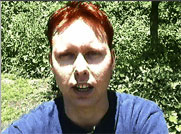 |
| Dave & Nate talk UFOs |
Even a tour of duty with one of the biggest rock
bands in history didn't quite prepare Grohl for
the challenge of fronting his own outfit.
"Sitting down playing the drums, you can duck
back and hide, and they're just so loud that you
don't really feel like it's you;' he says, indirectly
offering a possible motivation for the savage
backbeat powering Nirvana's intensity. Of the
Foo Fighters freshman tour, in which they
travelled the States opening for Mike Watt,
Grohl says, "It was so incredibly refreshing to go
out and do something where you're frightened,
really scared to do it. Every once in a while,
in the middle of a set, my stomach would turn
and I'd have a little panic attack"
Grohl is adamant that the Foo Fighters is a team effort. "My biggest fear is that this
will be seen as a solo project," he says. .'It's ridiculous because, I mean, I don't have
the charisma of Bono or Steven Tyler or whoever, and by no means do I want to be
considered Front Guy. That's like my worst nightmare." But feeding the nightmare
and the media's intense focus on Grohl is the fact that the album, actually recorded
before the group was assembled, is the work of a virtuoso one-man-band - Grohl
sings and plays every instrument. He and co-producer Barrett Jones pumped the
thing out in a five-day recording blitz back in October. Though most critics were
astonished by Grohlís unknown songwriting ability, the Foo Fighters album was
really just another in a series of tapes he's been making since junior high.
Initially, it was just meant to be a creative outlet, a chance "to be able to do your
own thing without making this big deal he says. "I never took it so seriously that
I thought, 'Wow, I'm gonna start a rock band and be the singer-guy and make
jokes between songs and smile for the camera:" But it didn't take long for
music-industry honchos to sniff out the demo. "All of the sudden I had like four
record companies calling me;' says Grohl. "It was crazy." In the end, he finagled
a distribution deal with Capitol that gives his own label, Roswell Records,
ultimate control over the material and the bulk of the profits.
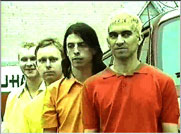 |
| The band perform Big Me |
After signing up Smear, Grohl reeled in Goldsmith and
Mendel just as Sunny Day Real Estate called it quits.
Goldsmith, who calls Grohl "one of my favorite drummers of all time," says thing got off to a rocky start.
'I really didn't feel comfortable playing drums for
Dave, I felt really weird and inadequate and stuff.
I sat down with him and I was like, 'This means
everything to me, but I don't feel like I have what it
takes; and he goes, Well, if you quit I quit. He was
unconditionally supportive:' After a few local outings,
the band joined Mike Watt for a U.S. tour, and following
a temporary derailment when Goldsmith popped
his left elbow out of joint hurdling a concrete post in a
parking lot, they took the show on the road again -
this time headlining. Determined to keep things
low-key, the Foo Fighters stuck to playing medium-sized venues.
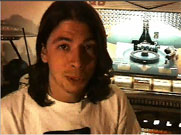 |
| Dave reveals the bands rider |
Going over a sample rider in preparation
for the tour, Grohl seems astonished by the perks
some bands require. "Itís fucking ridiculous Pat likes
Perrier and I just like Coca Cola and Budweiser in a
can. I'm pretty simple about stuff. I'm terribly boring."
Grohl does make a single concession
to wigged-out rockstardom: He's
something of a UFO enthusiast.
"I really relieve there's something
being kept from us;' he says intently.
"I mean, there's obviously something
going on, whether it's the military
testing their own craft or if itís something
else..." Out on the narrow deck of
his completely unassuming Seattle
ranch-style house he gazes into the
sinister forest of tall pines and lights
a cigarette. "I used to sit on my
porch and stare at the skies and
fucking pray I would see a UFO,"
he says. "But who knows? The idea
that there's something other than
the 5 billion people on this planet is
kind of entertaining."
Iím sure the album is going to be scrutinised and compared to Nirvana,"
Grohl sighs with resignation, "and sure, there are some similarities. I learned so
much about songwriting from Kurt:' The influence is apparent in that grunge
alchemy of irresistible hooks and ferocious guitar-driven punk aggression,
typified by ďIíll Stick Around But where Nirvana often worked to formula,
Grohlís songwriting is remarkably complex and varied in tone, ranging from
the elegiac Exhausted to the goof-ass lounge rocker For All die Cows.
And Grohlís self-assured vocals lack even a trace of Cobain's trademark
contempt. Even in a wail of muted frustration like Alone and Easy Target,
Grohl drops a heaping spoonful of sugar into the mix, singing with disarming
sincerity beneath the crash of guitars.
 |
| Drumming vs singing |
If the Foo Fighters manage to wipe that
smart-ass smirk off the face of nineties
punk-rock and sweeten grunge's embittered
medicine, it may only be because they really,
really enjoy playing music together.
"All of us came from dysfunctional band
experiences;' Grohl explains. This time
around however, the warm fuzzies appear
to have set in. "It's kind of a snuggly-kittens-
in-a-box type feeling" says Goldsmith, and
you can feel the connection between them
at work when Grohl inquires about the status
of "Will's broken wing" and emphasizes the
band's responsibility to "nurse him back to
health:' Or when Smear starts kneading
Grohl's shoulders. Or when Goldsmith
throws his good arm around Menders neck
or points a big wet kiss on Smear's face.
"The main concern is just the fact that were
doing it together and that we care about
each other," Goldsmith practically gurgles.
If there's a hint of sarcasm
there, ifs only designed to
hide the fact that he actually
means it. "Everybody's
really honest and open and
affectionate and supportive.
Itís, like, the perfect gig.Ē
Words: Aaron Gell
back to the features index








